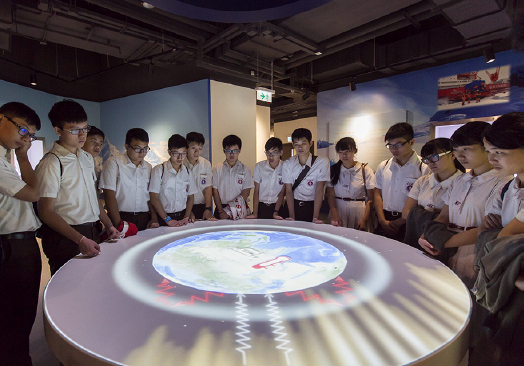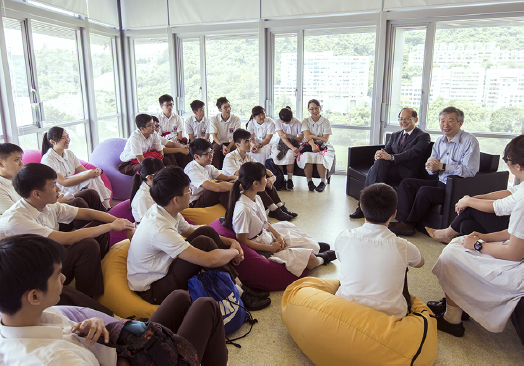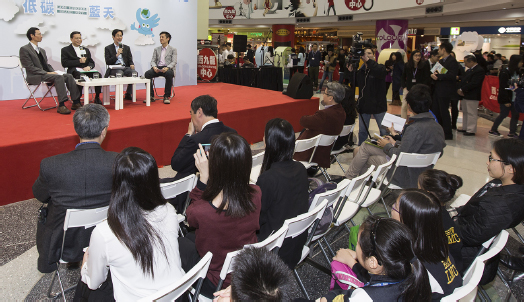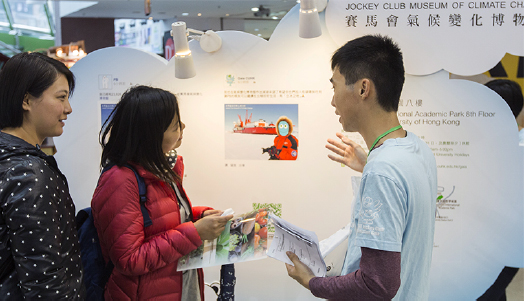• Coming to Grips With Climate Change • Bringing Green to the Grass Roots
Coming to Grips With Climate Change


Those are the lyrics to a song by a group of students from S.T.F.A. Lee Shau Kee College, which the group performed at the Environment Fair cum MoCC Roadshow 2015. Their aim is to use music to raise environmental awareness and to encourage people to lead a green, low-carbon life.
The students of the college are known for their environmental consciousness, and won an award in the Hong Chi-Hong Kong Jockey Club Community Organic Farming Competition. They’re also the champions of the Farmfest Organic Growing and Cooking Competition and runners-up in the Friends of the Earth Power Smart Energy Saving Contest. The award-winning students have been making a bit of a name for themselves lately. To deepen their understanding of climate-change issues and the environment, they visited CUHK’s Jockey Club Museum of Climate Change on May 12, to learn about the latest developments in the field.
They toured the exhibit profiling Rebecca Lee’s field work at the North and South Poles, and on Mount Everest. They also learnt about using satellites to monitor air pollution and track oil spills. After the tour, the students met with Professor Fung Tung, CUHK’s associate vice-president and a professor in the Department of Geography and Resource Management, to share their thoughts on climate change. The professor encouraged them to come at climate change from a variety of different angles, and to consider the various ways it is affecting the world. In turn, the students proved very keen to share their own thoughts on the topic.
After visiting the museum, one student said it was interesting to learn more about the North Pole. He also said that he now understands how melting glaciers are affecting our everyday lives, by causing sea levels to rise. This is already a serious issue for low-lying areas such as Venice, the Netherlands, Bangladesh and the Maldives.
Professor Fung challenged the students to ponder the effects on Hong Kong if the world’s glaciers continue to melt. The topic generated a round of heated debate. Given its hilly topography, the students thought that Hong Kong wouldn’t sink permanently. But they noted that heavy rain would lead to floods that would disrupt the economy, infrastructure, transportation and everyday life. They decided that Hong Kong’s many steep slopes would also be dangerous in heavy rain, which could cause deadly landslides. The North Pole may be remote, but this exercise rammed home the fact that climate change can cause a crisis at home.

The students and Professor Fung alike agreed that in order to counter climate change, we should start leading low-carbon lives. They also noted the importance of developing renewable energy. In everyday life, they decided we should adopt the 4 Rs – reduce, re-use, recycle and renew. Since resources are limited, we shouldn’t throw away items that can be re-used. We should repair things instead of buying new ones. Recycle whenever possible. Rein in consumption and reduce waste.
The topic of renewable energy sparked another round of discussion. The students view solar power, wind energy and biodiesel as viable forms of renewable energy. All CUHK halls are equipped with solar-energy panels, which generate power that is mostly used for hot water. But the students noted that the lack of a consistent strong breeze in Hong Kong makes it more difficult to harness wind energy. Professor Fung pointed out that a lot of vehicles at the Hong Kong International Airport run on biodiesel fuel, but the biodiesel is imported from countries that have sizeable agricultural industries. The students were asked, since Hong Kong has minimal farming, whether the city could use food waste to produce diesel instead. The students also pondered whether the use of renewable energy would drive up our electricity bills.
The students agreed that the museum visit and discussion had made it very clear that climate change is already having a direct effect on our lives. They feel it is vital that we slow down climate change and reduce global warming – and said it is an obligation of their generation to do so.
Bringing Green to the Grass Roots

Climate change and environmental protection often seem like abstract concepts, the subject of heated academic or regulatory debate. But the shifts in the globe’s climate and weather patterns are already having direct and significant effects on us now. The challenge is how to ram that home to the general public, who all too often feel hopeless in the face of such worldwide macro-level changes, and unsure of what they can do to arrest the process.
Of course, there are many ways that each and every one of us can contribute positively to the future of our planet. We should start by reducing carbon emissions, saving energy and using natural resources efficiently—although it is not always easy to explain how to put those concepts into practice. In an outreach effort to engage the public and provide some practical advice, CUHK Jockey Club Initiative Gaia and the Jockey Club Museum of Climate Change held an environment fair and roadshow on April 11 and 12 at the Dragon Centre in Sham Shui Po. The aim of the fair was to introduce the latest developments in climate change to “regular” Hong Kongers, and to impart other green advice to the local community. But it wasn’t all dry advice—the fair used fun interactive exhibits and events to relate climate change to daily life.
The two-day fair lured 25,000 visitors to the Sham Shui Po exhibition space, where they learned about the latest trends in environmental protection. It was the first time that the Jockey Club Museum of Climate Change had taken part in the event. The museum’s contribution emphasized the immediacy of climate change, and stressed the gravity of the situation. This in turn helped visitors to the fair to understand their roles and responsibilities.

Professor Anthony Cheung, Hong Kong’s secretary for transport and housing, officially opened the event. He also took part in an expert panel to explore the event’s theme, “Low Carbon • Blue Sky.”
To engage with the public, the fair also included interactive computer games. The Hong Kong Organic Resource Centre explored the issue of organic farming, while the Ng Yuk Secondary School showed the award-winning “Tree of Future” model developed by its students, which placed in the Energy Innovation Competition 2013–2014. Students from the S.T.F.A. Lee Shau Kee College delivered their own green message with a specially composed green song. CUHK students shared tips on how to reduce food waste, how they deploy those strategies on campus, and how they manufacture what are known as “garbage enzymes” or eco-enzymes. This involves turning kitchen waste from fruit and vegetables into a cleaning solution by fermenting the scraps with sugar and water. The concept fascinated many of the visitors, who took away one very practical way in which they could apply green concepts in everyday life.
“I liked the computer game the most, and I learned a lot about environmental protection,” Frederick, a primary school student who attended the fair, said. He had his picture taken with the Gaia mascot and shared the photo with friends on Instagram and Facebook. To top things off, he won a limited-edition tote bag from the Museum of Climate Change. Melanie, his elder sister, was also excited about visiting the fair. “I have participated in many interesting games today, but I have also learned that it is everyone’s responsibility to protect the Earth,” she said.






